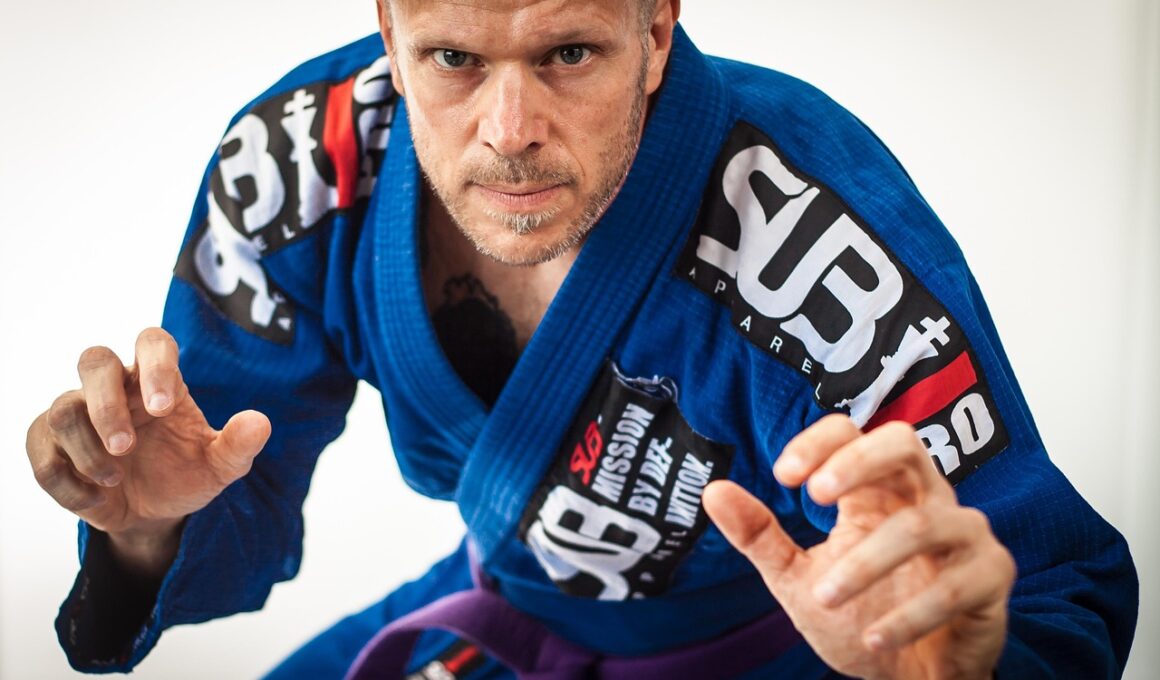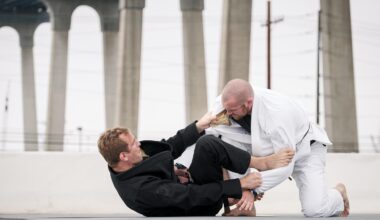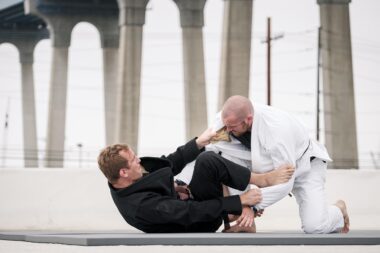Jujutsu vs Other Martial Arts: What Sets It Apart?
Jujutsu, a traditional Japanese martial art, distinguishes itself from other styles through its unique focus on leverage and technique over brute strength. While many martial arts emphasize striking, Jujutsu is primarily grappling-based, enabling practitioners to project opponents’ energy against them. This is achieved through a combination of throws, joint locks, and submission holds, making it particularly effective for self-defense scenarios. Unlike disciplines such as karate or taekwondo, which prioritize kicking and punching, Jujutsu practitioners learn to use an opponent’s mass and momentum, turning potential aggressors into victims. The art further emphasizes situational awareness, allowing students to assess their surroundings effectively. As a consequence, Jujutsu training often includes various aspects, such as ground fighting and self-defense techniques against armed and unarmed attackers. This methodology of addressing threats holistically sets Jujutsu apart within the broader martial arts spectrum, appealing to a diverse set of practitioners interested in self-defense or competitive sports. In essence, Jujutsu embraces adaptability and intelligence, pushing its students to become versatile fighters capable of handling many situations, far beyond single combat encounters.
Another vital element that sets Jujutsu apart is its philosophical underpinnings. The practice of Jujutsu stresses the importance of mental fortitude and discipline alongside physical techniques. This holistic approach influences practitioners to develop both mind and body, cultivating a sense of respect towards training partners and opponents alike. Most martial artists eventually discover that the lessons learned on the mat translate into everyday life, promoting a mindset focused on resilience, respect, and continuous improvement. In contrast, other martial arts may often emphasize competition or self-promotion, potentially leaving behind the essential philosophical teachings. Moreover, Jujutsu’s principles of yielding and fluidity resonate with students from diverse backgrounds, as they promote adaptability in various life situations. This philosophy encourages individuals to remain calm and collected, which can be beneficial in both martial arts and personal development. By mastering these principles, students learn that victory does not always reside in brute force but in strategic thinking and emotional control. This distinct outlook contributes to building a strong community among practitioners, with shared values reinforcing Jujutsu’s unique position within the martial arts landscape.
Training Methods in Jujutsu
The training methods employed in Jujutsu also set it apart from other martial arts. Students usually engage in both structured drills and free sparring, allowing them to practice techniques in realistic scenarios. This duality enhances adaptability, as practitioners learn how to apply their techniques effectively during unpredictable exchanges. Furthermore, students perform a variety of techniques, focusing on throws, pins, and submissions. In contrast, many striking-based arts often concentrate heavily on repetitive techniques, usually for sports competition. The emphasis on grappling in Jujutsu promotes learning about body mechanics and leverage, critical components contributing to a practitioner’s success. Additionally, flexibility, balance, and timing are vital to becoming proficient, reinforcing the idea that Jujutsu is more about skill than strength. Training sessions often incorporate situational drills where students practice responses to specific threats, enhancing their confidence in real-life confrontations. This comprehensive approach fosters a solid foundation in the fundamental concepts of self-defense. Over time, practitioners can better react to various scenarios, distinguishing Jujutsu students as some of the most skilled martial artists in high-pressure situations.
Jujutsu also incorporates a wide range of techniques drawn from various traditional Japanese martial arts. This diverse curriculum allows it to evolve continually while still respecting its origins. Unlike some styles that strictly adhere to established forms, Jujutsu welcomes innovation. Instructors often blend techniques derived from experience and modern realities, creating a responsive and adaptable training environment. This evolution reflects how Jujutsu continuously strives to maintain relevance in today’s society. Furthermore, learning to recognize and adapt to new strategies fosters creativity and spontaneity within practitioners. For those interested in an inclusive approach to martial arts, Jujutsu demonstrates its capacity to incorporate diverse techniques while still remaining functional. This adaptability contributes to the diverse practitioner base, from self-defense enthusiasts to aspiring competitors. As martial artists grow in their understanding and application of Jujutsu, they develop broader perspectives on martial arts as a whole. Ultimately, this unique characteristic enhances not only a student’s technical arsenal but also their appreciation for the martial arts journey, driving lifelong learning and improvement.
The Community Aspect of Jujutsu
The community aspect of Jujutsu further distinguishes it from other martial arts. Jujutsu clubs and schools often foster a strong sense of camaraderie among students. As practitioners sweat and overcome challenges together, they cultivate friendships that extend beyond the dojo. This network of support creates an inviting atmosphere for newcomers, encouraging individuals to start their martial arts journey without the intimidation commonly associated with competitive environments. It’s not uncommon for Jujutsu practitioners to share experiences from their training and personal lives, highlighting the importance of personal growth within this martial art. In contrast, some striking martial arts emphasize individual accomplishments that can alienate students who struggle with learning curves. By promoting teamwork and mutual respect, Jujutsu schools often attract practitioners from various backgrounds and skill levels. This inclusive environment contributes to a sense of belonging and pushes members toward achieving their goals. All these factors combined create an exceptional learning experience where everyone benefits from one another, making Jujutsu not only a martial art but also a supportive community.
The effectiveness of Jujutsu in real-life self-defense situations is another factor amplifying its significance among martial arts. Many practitioners choose Jujutsu for its proven ability to neutralize threats, providing confidence in various confrontations. Unlike some striking arts that require physical strength to deliver powerful blows, Jujutsu empowers smaller individuals by equipping them with techniques to control and submit larger aggressors. This principle of utilizing leverage leverages one’s body weight against an opponent, making it accessible for diverse individuals. Furthermore, Jujutsu emphasizes the necessity of situational awareness, teaching students to assess threats before physical engagement. Each lesson learned in a controlled environment translates into invaluable skills in real-life situations, fostering confidence. With the growing concern for personal safety in today’s world, many people seek martial arts that promote self-defense effectiveness. Jujutsu is often regarded as one of the most practical choices, providing strategies to manage conflicts efficiently. This reputation bolsters its popularity, attracting students looking for realistic, effective self-defense options that extend beyond traditional martial arts.
Conclusion: The Unique Appeal of Jujutsu
In conclusion, the unique appeal of Jujutsu stems from its focus on leveraging technique and adaptability over raw power, making it distinct from other martial arts disciplines. With its philosophical teachings promoting mental discipline and resilience, Jujutsu cultivates well-rounded individuals dedicated to continuous improvement. The diversity of training methods prepares students for various scenarios while developing their grappling and self-defense skills. Additionally, the close-knit community aspect nurtures an environment of support and encouragement, enhancing the overall learning experience. Such benefits draw in individuals from different backgrounds, making Jujutsu accessible and attractive. The art’s effectiveness in practical self-defense situations further solidifies Jujutsu’s position among martial arts. As practitioners acquire a deep understanding of techniques, they may discover personal growth stemming from their dedication and discipline, both on and off the mat. These attributes allow Jujutsu not only to persist but to thrive in today’s martial arts landscape, demonstrating its timelessness and relevance. As students continue on their Jujutsu journey, they embrace lifelong learning, motivating others to join this extraordinary martial art beautifully blending tradition, technique, and community.
As Jujutsu continues to grow in popularity, it will remain an art form that is both relevant and exceptional. The principles of adaptability, respect, and situational awareness ensure that Jujutsu remains a robust choice for practitioners, regardless of their skill level or personal goals. By understanding its differences from various other martial arts, individuals can make informed decisions about their self-defense and martial arts training. Furthermore, as Jujutsu influences new generations of martial artists, it will undoubtedly evolve into new methods and techniques, ultimately sustaining its legacy. Jujutsu’s allure lies in its comprehensive approach to combat, making it appealing to individuals seeking practical self-defense skills while simultaneously exploring the philosophical depths of martial arts. As students dedicate themselves to this art, they also delve into an enriching experience, forging lifelong friendships and valuable life lessons. This unique ability to connect on personal levels with others reflects the shared journey of personal growth that unites all practitioners. In the end, Jujutsu stands out not merely as a martial art but as an ongoing path toward self-discovery and transformation.





